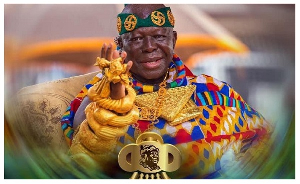Opinions of Saturday, 16 May 2009
Columnist: GNA
Refocusing the Media Agenda
A GNA Feature by Mohammed Nurudeen Issahaq
Accra, May 13, GNA - Tradition now has it that each year, the month of May be devoted to the performance of the press and the challenges of journalism worldwide, with May 3rd observed specifically as World Press Freedom Day.
This time, therefore, is appropriate for some appraisal on the role of the press/media in our national history, and some reflection on how the power of the mass media can be channelled towards the socio-economic development of this nation of ours.
It is unfortunate that the press has over the years earned a negative reputation from members of the same society it has served so selflessly. This pejorative image, however, does not change the fact that the press once had its proud/gallant moments which the following recap intends to expose for the benefit of the younger generation, especially, and all other interested readers at large. This generation, and particularly the present crop of journalists, need to know the circumstances that shaped the journalism profession in the country, and the reason for the relationship that currently exists between the mass media and officialdom.
The Historical Perspective:
History holds that the then Gold Coast press played a pivotal role in our nation's struggle for emancipation from colonial rule. Like the story in other parts of British West Africa, the genesis of Ghanaian journalism (and for that matter, the Ghanaian press) can be traced to early missionary literature and, most significantly, official gazettes and government-operated publications during the days of British occupation.
Ali Mazrui, the reputed Kenyan writer and scholar, remarks that "It is not for nothing that the word for newspaper in Swahili is 'gazeti'. The Adam and Eve of newspapers in Africa were government gazettes." It began in Sierra Leone in 1801 with the publication of the Royal Gazette. Twenty-one years later in 1822 Ghana (then Gold Coast) followed with the publication of the Gold Coast Gazette.
The colonial press in the Gold Coast was, however, ethnocentric in orientation and content, and tended to work for the preservation of the political status quo. It was essentially an organ for satisfying the information needs of the colonial administrators and other European settlers, who remained European in outlook. News of the Metropolis (London) dominated the external reports while news of the expatriates' exploits occupied the principal place in internal affairs. For all practical and journalistic purposes, the indigenous population did not exist. Their social, cultural, political and economic aspirations were simply ignored.
This exclusion of the native majority from the colonial news system did not just accentuate local discontent, but also created an information vacuum that had to be filled.
The existence of a press primarily operated by Europeans convinced the local elite that it was important to have their own press to reflect their own opinions and desires. Thus the Black Nationalist Press in the Gold Coast was born in response to the exigencies of the moment. Its rebellious agenda was a cumulative reaction to the oppressive and patronizing attitude of the colonial rulers. In his book Muffled Drums (1971) W.A. Hachten submits that indigenous English-language press developed in British West Africa first to publicise grievances and criticise the British rulers. "Later, it became a political weapon in the struggle for nationalism, to facilitate the organisation of political parties, and finally to win independence itself." And from the perspective of Ziegler and Asante (1992), the indigenous African newspapers of this era were political and spoke out on issues related to the rights of Africans. "...Thus Africans were galvanised toward independence and freedom by the media." These developments in the Gold Coast, just as in other African colonies, presented a situation in which colonialism gave birth to nationalism which eventually overthrew it. Looking at the trend, one cannot but acknowledge also that the press and political power have influenced each other since the dawn of our history. The press gave to nationalism its prime means of diffusion, the medium through which the idea could be disseminated. Nationalism in turn gave to the press its principal message, its raison d'etre, in extending its circulation.
The Nouveau Elite and Ex-Combatants:
Just as the colonial officials had used it to propagate their imperialist ideas, so did the country's early elite use the press to convey their own protest against colonial domination. Another important development which changed the course of history in the Gold Coast during that period was the return of brilliant young men who had been pursuing further studies in Europe and America. Some of these returnees had been exposed to the ideas of Marcus Garvey, Martin Luther King, and other civil rights activists. Dennis Austin (1964) observes that these returnees were "the first seed of nationalist thought that brought about the formation of the earliest political movements." One such movement was the United Gold Coast Convention (UGCC) launched in 1947 by Willie Grant, J.B. Danquah, and R.C. Blay.
Those young intellectuals added vim and momentum to the nationalist struggle through their radical ideas. The contents of the indigenous newspapers took on a bolder tone. "The Western Echo," "The Gold Coast People," and "The Accra Herald" (which later became The West Africa Herald) established in 1857, all became channels for the hitherto voiceless indigenous population to express their discontent against the colonial authorities. Existing much earlier than the above-mentioned publications; was the "Royal Gold Coast Gazette and Commercial Intelligencer," a handwritten gazette launched in Accra in 1822. There was also the "Royal Gold Coast Gazette" (1852), the "Gold Coast News" (1885), and "Gold Coast Herald" (1886). By 1900, about 20 of such local newspapers, most of them handwritten, had occurred in the Gold Coast. And there was one characteristic they all had in common - the anti-colonial tone of their content.
The era between 1900 and 1940 saw a further proliferation of small indigenous newspapers in the Gold Coast as cocoa and gold production brought prosperity, and more people became literate. A good number of the emerging elite started their own newspapers. Among them were J.E. Casely Hayford and Atto Ahuma, who founded the "Gold Coast Aborigines". There was also J.B. Danquah who launched the "West Africa Times" in 1931. The Times was the first daily newspaper in West Africa to carry regular international news from Reuters.
The arrival of Kwame Nkrumah on the scene, and the establishment of his paper, "The Evening News" in 1948, marked an important watershed in Ghana's press/political history. Says Frank Barton (1979): "When The Graphic appeared in Accra, a young political firebrand not long back from university in the United States was editing the highly volatile Evening News. He was Kwame Nkrumah, leader of the Convention People's Party (CPP)." And in a related submission, Dennis Austin (op cit.) also states that at the end of 1947 a new actor appeared on the scene, who was "destined not only to dominate the events of the years that followed his return to the Gold Coast, but to destroy the UGCC as a political force".
The return to civilian life, of a group of dissatisfied ex-servicemen recruited into the Royal West African Frontier Force (RWAFF) during the Second World War added fuel and momentum to nationalist activity in the Gold Coast at the time. It did not take long before an alliance was forged between the intelligentsia of the UGCC, which had emerged as a dominant political movement, and the aggrieved ex-servicemen. The two groups found solidarity in their opposition to, and mutual dissatisfaction about, the prevailing political, social and economic circumstances of the moment. Hence, the agitation of the aggrieved ex-servicemen, coupled with radical political demands advanced by the intelligentsia, kindled the flame of nationalism in the Gold Coast and set the liberation struggle there on an irreversible course during the late1940s and early 1950s.
The Clamp-down and the Rebound:
The initial reaction of the colonial authorities in the Gold Coast towards the indigenous newspapers was to dismiss them as crude and insignificant. However, they soon realised that by propagating opinions favourable to the course of the nationalist leaders, the press was capable of inciting the people and threatening the whole basis of colonial power. As a result, the colonial officials began to subject the Gold Coast press to arbitrary and harsh control measures. Throughout 1950, there was a procession of victims in and out of the Accra and Kumasi prisons, among them T. Hutton Mills and K.O. Quashie of the Evening News. Wilcox (1975) relates that in 1950, the colonial administration banned the Accra Evening News and arrested its editors for sedition. "The paper, started by the Convention People's Party, was a major vehicle for nationalist thought." So it can be seen now where successive African political leaders got their ideas about gagging the media from. Interestingly, Azikiwe, Nkrumah, Nyerere, Kaunda, Kenyatta, and a number of other first generation rulers in post-independence Africa, had used the press to wage the liberation struggle in their countries and were, therefore, very much aware of its inherent power. Now back on track. The clamp down by the colonial administrators turned out to be a catalyst rather than a deterrent. The press became even more hard-hitting as nationalists' activities reached a crescendo. For instance, the "Evening News" which was the mouthpiece of Nkrumah's CPP published in its edition of Thursday, December 15, 1949 a declaration by the party's leader: "...the British Government has tactfully refused to grant the country her true and legitimate demand for self-government ...The people of this country will be waiting patiently for two weeks from today, 15th December, 1949 during which the British Government might announce through the Governor, the acceptance of the principle of a Constituent Assembly to be implemented without delay; otherwise, Positive Action may be declared any time after the said two weeks." (Austin, 1964:88).
Obviously, in the view of the colonial authorities, Nkrumah had begun to fly too high for he did declare 'Positive Action' on Sunday, 8th January 1950. A general stoppage of work ensued throughout the colony and people took to the streets. The colonial government issued orders for the arrest of Nkrumah and five other nationalist leaders (later known in Ghana's political history as the Big Six), accusing them of having incited revolt. To a very large extent, they had indeed rendered the colony ungovernable for the authorities, and for that they were apprehended and placed in detention.
While in prison, Nkrumah continued to guide his party and its followers through his writings, which were smuggled out and published in the party newspaper. Nkrumah's imprisonment turned out to be a blunder on the part of the authorities, as his popularity and that of the CPP soared. His party won a great victory in the 1951 elections. Consequently, he was released and appointed Leader of Government Business by the colonial Governor. This victory won by the CPP was repeated later in two subsequent elections, the 1954 polls and the decisive 1956 general election which led to the granting of full independence on 6th March 1957.
These events are a confirmation of the vital role the press played in the liberation process in the Gold Coast, and the subsequent creation of the modern state of Ghana.
However, one may ask: "After its praise-worthy performance in the overthrow of the colonial master, what became of the press in post-independence Ghana?" Knowing very well what the press was capable of doing, the nationalist leaders, who had now taken over the mantle of leadership as Africa's first post-independence rulers, decided to kick away the ladder they had used to climb to pinnacle of political power. They began to hound the press and journalists in a bid to bring them under control. On this point Barton observes that the African press in the immediate pre-independence era was a strong advocate for political change but that when that change materialized, the relationship between the press and liberation leaders now in power became estranged. "Rather than the hunter, the press became the hunted." (Barton,1979:16). However, that is an entirely different area which time would not permit us to delve into now.
Paradigm Shift:
The key point about this lengthy journey back into our past is that the press which so gallantly spearheaded the country's liberation struggle and onward march to political independence is also capable of championing the cause of economic emancipation, given the determination and focus. This resetting of the Ghanaian media agenda could begin with government demonstrating its commitment to creating an enabling environment by refraining from any discriminatory attitude towards any sections of the media. According equal recognition and support to both state-owned and private media and allowing the provisions enshrined in Chapter 12 of the 1992 Constitution alone to work. The Government must refrain from categorizing any section of the media as anti-us or pro-them. This would help to build trust between the Government and the media, as well as instil some level of sanity in the practice of journalism. The other issue of import is to improve the conditions of service of journalists in the country so that poverty does not drive them into the hands of unscrupulous politicians. Again, resetting the nation's media agenda would also require journalists to depart from the undue politicization of the media and to pertinent national issues. We live in an era when it has become extremely difficult to distinguish between a journalist and a political party activist. The media landscape has become dangerously politicized, with some journalists throwing professionalism to the dogs and getting openly biased in their approach to issues. That, certainly, is a deviation from the path chartered by our predecessors as history tells us. The media in this country began with a mission to bring total freedom to the people. Even though most of our country folk consider this goal as having been accomplished with the winning of political independence, the truth is that the most important aspect of our freedom, namely economic emancipation, has eluded us for the past 52 years. The battle, therefore, is far from over.
Once again, it is up to the media to reawaken the national consciousness and to galvanize the people for action in the crucial struggle for economic independence, without which our political freedom won on 6th March 1957 becomes meaningless. And the press cannot fail in this task because judging from its capabilities during the colonial era it has the power to lead and to succeed once it sets the agenda for the entire nation.
The time has come for journalists to de-politicise the nation's media, and to turn them into a true marketplace of ideas, where vital issues pertaining to our march to economic freedom are objectively appraised, and constructive suggestions/alternatives provided for the consideration of policy-makers.
The positive use of press freedom, which includes critical but constructive debates on development issues, has contributed to the success and well-being of Europe and America as we see them today. In spite of its abundant human and natural resources, Africa as a whole has remained backward in development terms mainly because she suffers from what some analysts refer to as the poverty of ideas.
It is ideas and the know-how that can transform those resources into wealth to solve the myriad of problems confronting the people. The media could be of benefit in this regard by identifying and stimulating public debates on some of the key issues of concern about the national economy and about job creation. Through the engineering of such discussions, the media would allow for a clash of various shades of ideas, opinion, and suggestions out of which some useful ones could emerge for adoption.
This resetting of agenda would not prevent the media from continuing to hold government accountable to the people. It only calls for a departure from pettiness, the removal of unnecessary media emphasis on politics, and the shifting of that emphasis onto issues about improving the economic and social well-being of our society. While journalist continue to keep Government on it toes and ensured that politicians kept to their campaign promises, they should also follow parliamentary debate consistently with keen interest and should stimulate public debate and ensure that whatever arises from there gains currency. At the same time the various outlet could be used to exploit/expose the country economic potential and tourist attraction to woe foreign investment.
It is the belief of many that the over politicization of the media stems largely from the tendency of those in political power to tacitly reward journalists, who toe their line. Therefore, government officials would contribute immensely to putting a stop to the phenomenon of partisan journalism if they would help to make sycophancy less attractive.
The general public would also be playing a crucial role in the entrenchment of the proposed new media culture by abandoning the taste for mischievous sensationalism, demonstrating practical support for media outlets that consistently tackle issues of national importance, and by participating actively in the debates that ensue. That is the only way to help to transform the media into true agents of positive social change rather than political tools for our own undoing. When the signs point to the end of a particular era and change becomes inevitable, it pays to accept that fact and to make the necessary adjustments. Even the die-hard communists in the erstwhile Soviet Union could not but succumb to the transformatory winds of 'Perestroika' and 'Glasnosts' rather than swim against the tide. Similarly, it would do this country a lot of good if media practitioners came to the realisation that the era of militant journalism, when being blatantly anti-government (even if there was no call for it) was considered as vogue in the profession, and when only journalists, who had been to prison were regarded as the best, is gone. Useful as it was, adversarial journalism fitted well into the prevailing political and social circumstances of the pre-independence era, which paid off well by helping to win political independence.
The challenges that confront the nation today, however, are of a totally different nature and demand a different combat strategy on the media front. The fight for economic emancipation in today's technologically sophisticated world is rather of a scientific nature and has more to do with ideas, hearts and minds than rough tactics or jungle warfare. To continue to use the same old confrontational media agenda of the 1940s in our search for economic freedom today could be likened to the dancer who failed to change his dance-style even after the beat had changed to a different rhythm. One thing is for certain, though. If the media today should gang up against poverty and under-development with the same determination and sustained effort as the pre-independence press approached the task of de-colonisation, and given a well-focused leadership, this nation would score a decisive victory in the crucial fight for economic freedom.
The famous muckraker, Upton Sinclair, once asked "What good does it does us, to fight for freedom abroad if, in the meantime, we are losing it at home?" So in the same vein, we ask fellow Ghanaians what good it does us to tear at each others' throats and strip each other naked publicly in the name of partisan politics, only to wake up the next morning and find stark poverty staring us all in the face without discrimination!












